Although 1993 is acknowledged as La Boite’s first fully professional year, the transition toward professional status began with David Bell’s appointment as Artistic Director in 1991. He accepted the position on the understanding from the Board that La Boite was going to become a professional company under his directorship.
He already had a long history with La Boite having directed 14 main house productions since 1975, including such artistic and box-office successes as They Shoot Horses Don’t They? and Bouncers, and designed over 25 shows. Although Bell’s time as AD was only 18 months, this period was the beginning of La Boite’s transition to full professional status with his first season of five plays operating on a profit-share basis.
This season was characterised by highly theatrical, innovative works that crossed artistic boundaries blending dance, circus and opera with theatre: Road directed by David Berthold, Bouncers directed by David Bell, When I was a Girl I Used to Scream and Shout directed by David Bell, Burn This directed by Jennifer Flowers, and Briefings for a Descent into Hell an original dance theatre work directed by Jacqui Carroll. Queensland Arts Division and the Australia Council grants supported his second season in 1992 of three professional productions: Mirandolina, The Idiot and Horrortorio.
Whilst both seasons were artistically successful the swift transition from pro-am to professional in a time of economic recession almost proved the company’s undoing. These were turbulent times generally for the Brisbane theatre industry and it was a real possibility that La Boite might succumb to the same fate as TN! Theatre Company, which closed its doors in 1991.
Amazingly, by November 1992 the Queensland Arts Minister Dean Wells had announced a rescue package – an initial grant of $225,000 for La Boite and $18,000 for La Byte Youth Theatre, followed soon after by a Queensland Arts Division loan of $100,000. The deal was that the loan would be converted to a one-off grant as long as three conditions insisted upon by the Queensland Government were in place. These conditions were that the loan be matched dollar for dollar by the Company, and that a new Artistic Director and a General Manager, capable of setting up a viable professional company, be appointed. To meet the first condition, the Board made the tough decision, and a very unpopular one with significant sections of the membership, to sell off one of its properties, the house at 52 Sheriff Street, Milton.
There is little doubt that the Government would not have come to the party if La Boite did not have the security of its own theatre building as collateral or a property to sell to supplement Government funding. In this time of a national economic recession, La Boite’s recovery also would not have been achievable without the determination and hard work of Board Chair Philip Pike and Honorary Treasurer Peter Lawson.
Sue Rider, appointed Artistic Director in 1993, new General Manager Deborah Murphy, Pike and Lawson proved a formidable team at a time when La Boite found itself at a crossroad leading either to success or failure as a professional theatre company. Their strong leadership and a sympathetic and supportive Queensland Arts Ministry were the keys to La Boite’s successful and historic transformation into the professional company that Jennifer Blocksidge had dreamed of 20 years before.
From the beginning of her term, Sue Rider guided La Boite into a period of unparalleled growth. By the end of her second year, she had been awarded a prestigious Matilda Award for her strong and visionary creative steering of the company. The quality of her directorship drew to La Boite outstanding Queensland theatre professionals. Her policy of championing commissioned new works by Queensland playwrights and new Australian plays was unprecedented in the State’s cultural history and contributed substantially to its success.
Why did she pursue this policy? In a summary document that Rider wrote on the eve of her departure from La Boite, she said “because the venue was wonderfully supportive to new work (and artists).Queensland lacked a company with any kind of Australian focus at the time and La Boite was suffering something of an identity crisis and was in need of a vision.” She added that “relating to the national scene, it seemed sensible to position the Company as an originator and producer of Australian writing, a Queensland counterpart to Playbox [now Malthouse Theatre] in Melbourne and Griffin in Sydney.” Part of that strategic plan was to capitalise on the Company’s strengths which she identified as “the uniqueness of the venue (theatre-in-the-round), community affection for the theatre as a place that nurtures emerging artists, and the Company’s reputation for cutting edge work”. On a State level this policy set La Boite apart from QTC, Queensland’s major company; on a national level it boosted its profile and aligned it with other forward-thinking companies. Strategically it worked to the Company’s advantage as it moved to consolidate its new professional status with State and Federal funding bodies, on whose ongoing support it heavily relied.
Rider’s determination that Brisbane’s second major professional company was to become a hothouse for developing new work resulted in an impressive 13 productions of new works commissioned by her between 1994 and 2000, the most successful of which were Long Gone Lonesome Cowgirls by Philip Dean, X-Stacy by Marjory Forde, A Beautiful Life by Michael Futcher and Helen Howard, After January by Philip Dean, adapted from the novel by Nick Earls, Georgia by Jill Shearer, 48 Shades of Brown by Philip Dean, and Milo’s Wake by Marjory Forde and Michael Forde. By the end of the final decade of the twentieth century, La Boite’s national acclaim rested on Rider’s gritty commitment to Queensland artists, development of new Queensland works, State and national tours, and overall support for Australian plays.
Rider wisely balanced her own vision for La Boite’s future with a publicly expressed recognition and acknowledgement of the Theatre’s history and the contribution of generations of members. In her first program notes as Artistic Director, she wrote:
La Boite is both the oldest and the newest theatre organisation in Brisbane. The oldest because, as Brisbane Repertory Theatre, it has been the place for theatre since the earliest amateur days. The newest because 1993 sees the Company’s first full year of professional activity.
La Boite has often been at the forefront of the performing arts. When professional theatre was in its infancy, La Boite was spawning directors, actors and designers who have since gone on to make their mark in this State, nationally and even overseas. As La Boite now becomes fully professional, let us celebrate this new stage in our development with the satisfaction of knowing that La Boite would not be where it is today without the support, work and love of all of you, past and present, young and old, who have given of yourselves to make theatre in this endearing place.[i]
With the spotlight firmly on her to deliver, for her first season Rider chose six Australian plays (five of which were Queensland premieres and one a world premiere) and one non-Australian contemporary work. In a year in which Rider, Murphy, Pike and Lawson had to woo back Australia Council funding, her choices were a good match with at least some of the funding body’s preoccupations at the time – Australian works, innovation, artists from non-English speaking backgrounds, and women in the arts. Not only were the majority of her plays Australian but five of them were written by women, three had predominantly female casts, and all but three were directed by women. By early 1994 La Boite’s Arts Queensland funding had considerably increased, and that the Australia Council had granted it Annual Funding for the first time.
Until 1997, Rider’s seasons were exclusively Australian except for her yearly Shakespearean play which she consistently set within a contemporary, usually Australian, context to ensure accessible productions for Queensland audiences, especially school audiences. With growing confidence that La Boite’s constituency would support an entire program of Australian theatre, the usual Shakespeare was dropped in 1997 when Rider produced her first ever season of six Australian plays. A critical success, the all-Australian season represented, in Rider’s estimation, “one of La Boite’s strongest years since professionalisation”.[ii] By 1999, the year that La Boite received a Special Matilda Commendation for outstanding contribution to the support and development of new Australian works, Rider took the number of plays by Queensland writers to an unprecedented four.
Another policy to which Rider stayed true for the duration of her term was the priority she gave to employing Queenslanders. Given La Boite’s long history as a training ground for Queensland theatre workers, and the proliferation of acting and technical production graduates from Queensland institutions now keen for professional work in Brisbane, it would have been surprising if she had done otherwise. The defunct TN! Theatre Company had been strongly Queensland-centric and this stable of artists now looked to La Boite for work (as well as, of course, to QTC and smaller companies). She almost exclusively used Queensland actors, including many who received Matilda Awards or Commendations for their work at La Boite, and actively promoted Aboriginal and Torres Strait Islander artists by employing blind racial casting in a number of plays including Freedom Ride, The Taming of the Shrew, Low and Romeo and Juliet.
In what was to be the final year of Rider’s term as artistic director, in 2000 La Boite was an extraordinarily successful company with an average occupancy of over 80% per season and its highest box office revenue in its history. With a turnover of $1.4 million in 2000, it had employed 100 theatre professionals, received generous Arts Queensland and Australia Council funding and had ended the year with a healthy operating surplus -“another fabulous effort” reported the Treasurer.
Sue Rider's remarkable eight year contribution to this historically significant period of La Boite Theatre Company’s growth and development was publicly acknowledged in 2000 with a Special Matilda Award for services to Queensland theatre as La Boite’s Artistic Director since 1993 .
Writer: Christine Comans
[i] Kiss of the Spider Woman Program, 1993.
[ii] La Boite Theatre Inc.1997 Annual Report p.1, La Boite Archives.
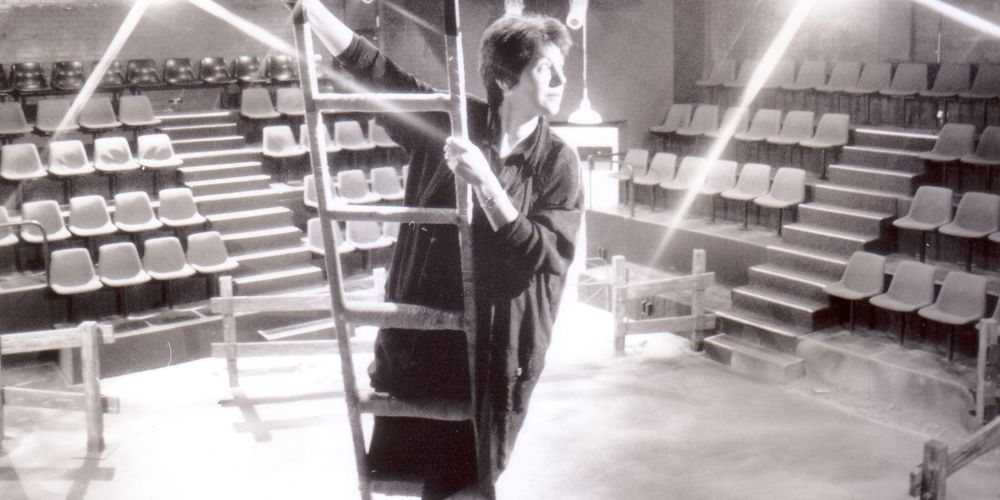
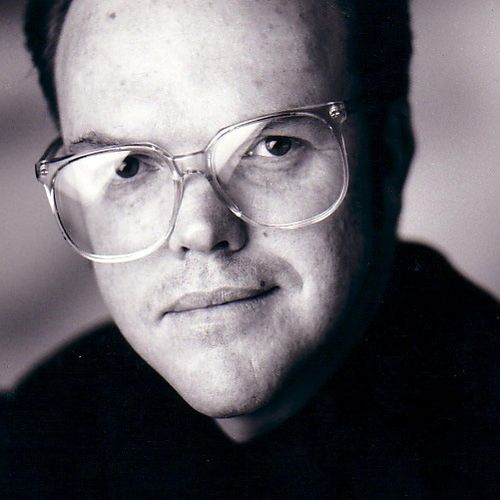
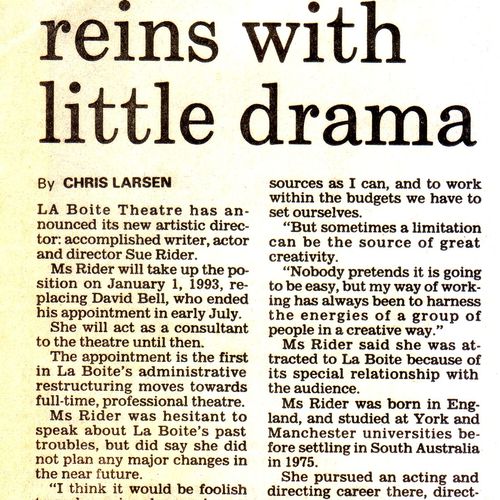
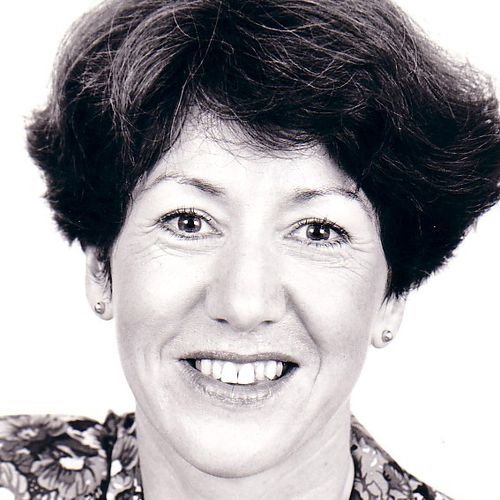
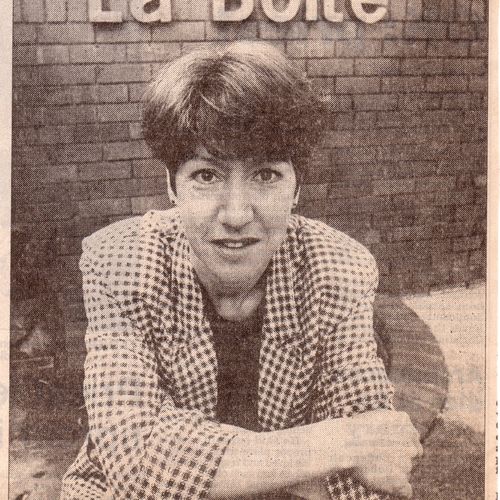
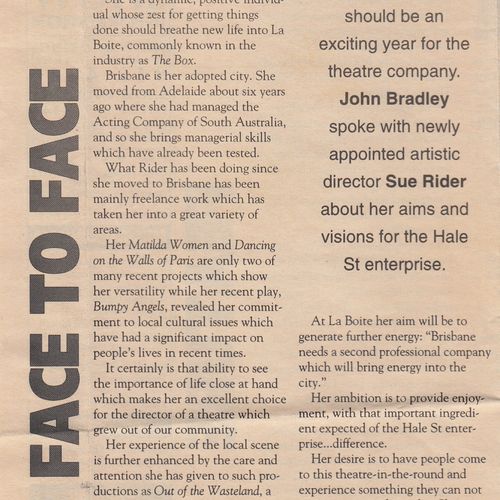
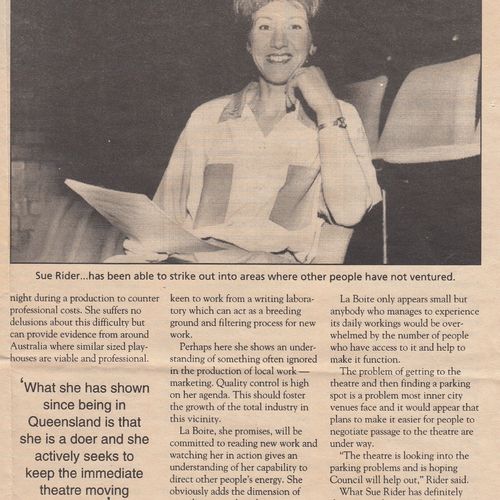
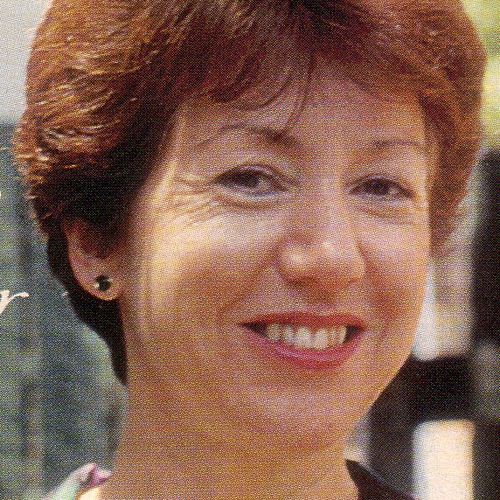
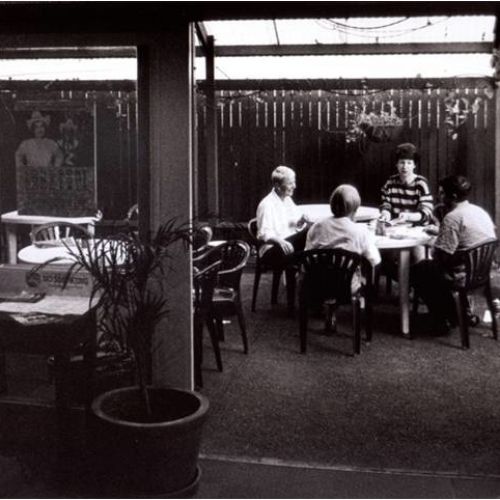
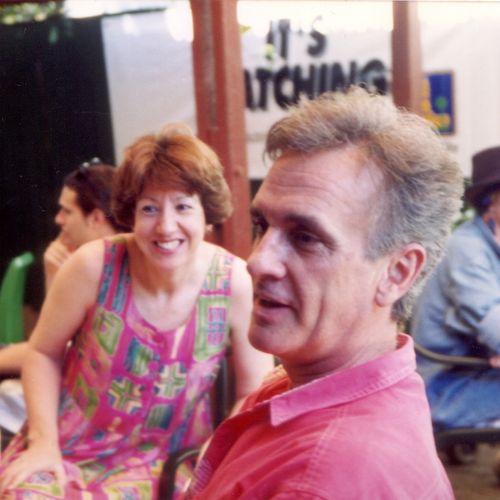
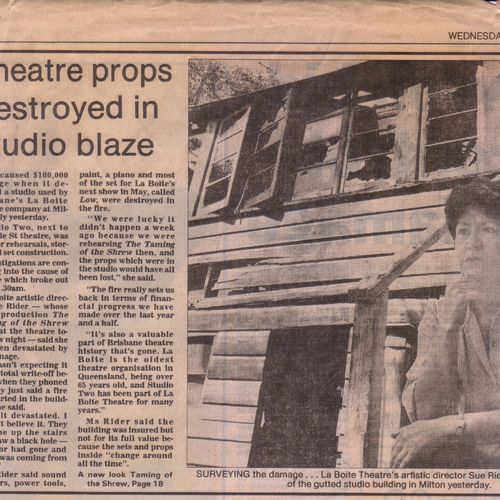
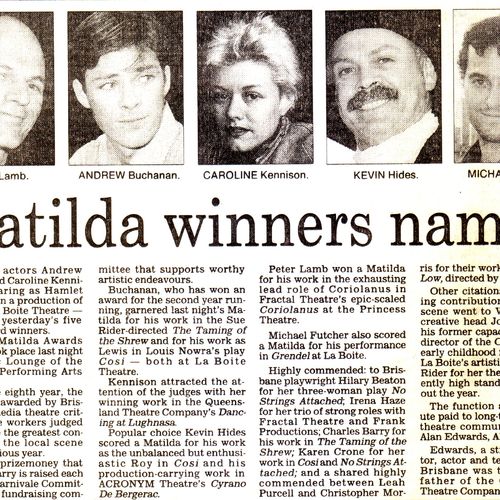
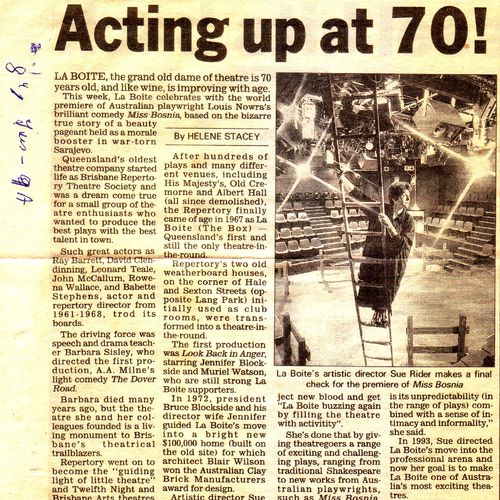
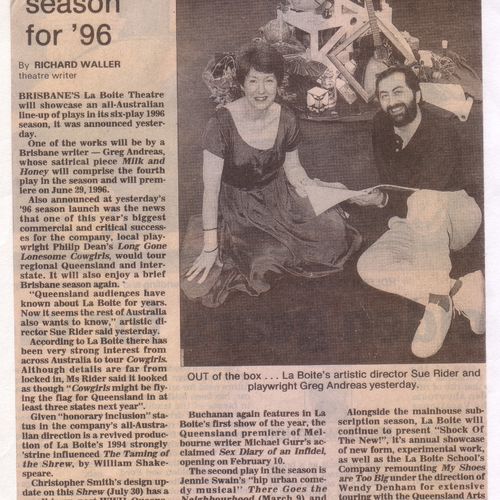
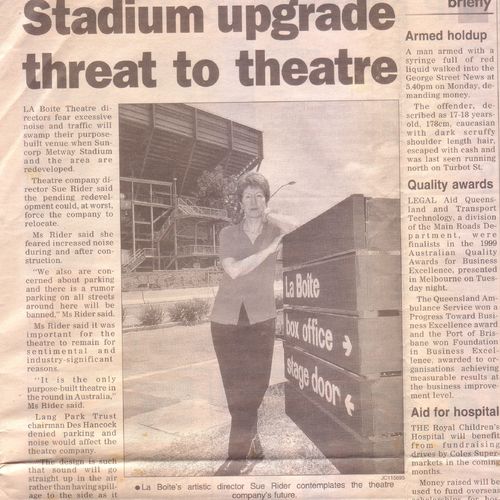
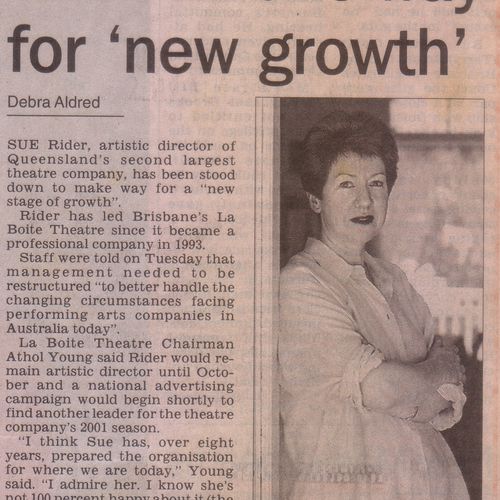
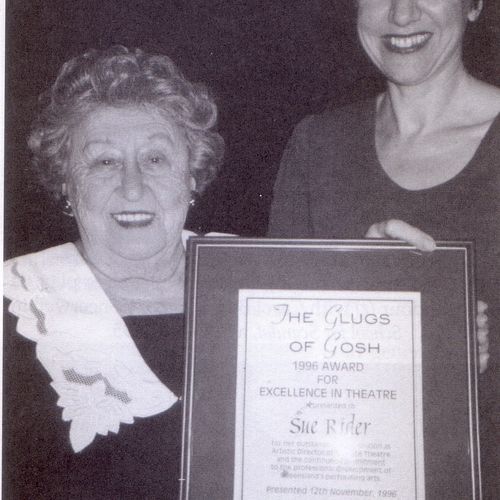
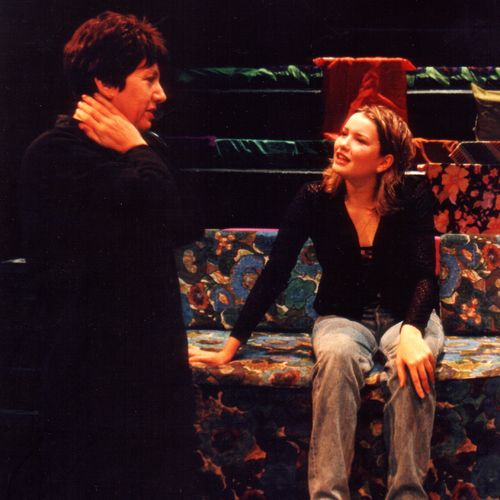
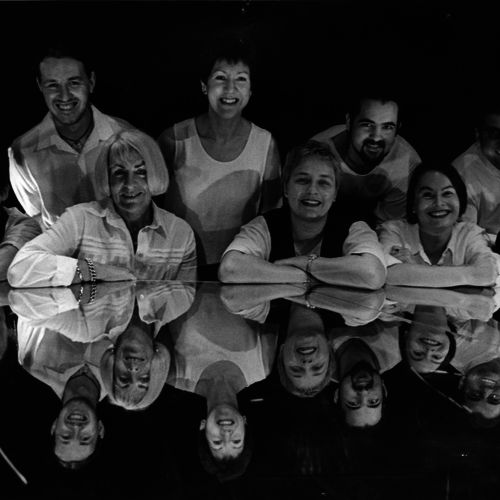
Tell us your story